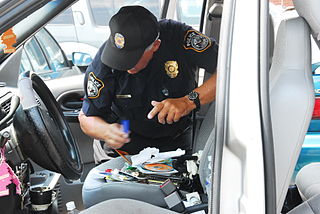Federal Court: Cops Cannot Push Drug Dog Into Open Car DoorFederal appeals court allows woman with religious license plate to sue cops who made a drug dog alert on a drug-free car.TheNewspaper Jun. 24, 2014 |
Popular 
Only 15 Senators Vote to Block Arms to Israel, Despite Majority of Americans Wanting Aid to End

IDF Gunned Down Gaza Paramedics in Clearly Marked Emergency Vehicles, Recovered Video Shows

Key October 7th 'Mass Rapes' Witness Featured in Sheryl Sandberg Film 'Exposed as a Serial Liar'

Rabbi Tells Senate Hearing It's 'Not Enough' to Be 'Not Anti-Semitic' - 'One Must Be Anti-Anti-Semitic'

Sen. Schumer: 'My Job is to Keep the Left Pro-Israel'
  Utah state troopers who used a drug dog as a pretense to search a car belonging to an innocent woman are in legal trouble. The US Court of Appeals for the Tenth Circuit on Friday ruled that the victims could sue the troopers for spending two hours rifling through their vehicle without finding anything unlawful, in violation of their constitutional rights. Utah state troopers who used a drug dog as a pretense to search a car belonging to an innocent woman are in legal trouble. The US Court of Appeals for the Tenth Circuit on Friday ruled that the victims could sue the troopers for spending two hours rifling through their vehicle without finding anything unlawful, in violation of their constitutional rights.Utah State Trooper Brian Bairett had been running a speed trap on Interstate 15 when a Jeep driven by Sherida Felders passed through. Bairett said he developed probable cause during the traffic stop because she was nervous, had an air freshener and her license plate holder said "Jesus." Trooper Bairett accused Felders, a 54-year-old, of transporting cocaine. She denied the accusation and refused his request to search the car. After a drug dog was called in, Trooper Bairett explained the situation to its handler, Iron County Sheriff's Deputy Jeff Malcom. "This lady -- you know, I walk up to the car and I see air fresheners in the center console and... I start talking to her, you know, just 'So where, you heading to?' 'Oh going to Colorado,' blah, blah, blah," Trooper Bairett said. "To me, I've got probable cause to search the vehicle without her permission or not, so I figured the dog would be the best route to go right now." Trooper Bairett ordered two teenage passengers out of the Jeep, along with the Chihuahua that was riding in the back. Deputy Malcom explained he intended to leave the door open when the teenagers got out. Dashcam footage recorded what happened. "Nice of them to leave the door open for you," Deputy Malcom said. "Yeah it was, wasn't it?" Trooper Bairett responded. Then the drug dog, named Duke, walked around the car and jumped right through the open door without alerting. Once inside, the dog alerted to the center console. It had two packages of beef jerky. The dog next alerted on the driver's door, which contained nothing. The lower court found the search improper and refused to grant immunity, so Deputy Malcom appealed. "We agree with the district court that Malcom did not have probable cause to search the car prior to Duke's alert and that the law was then clearly established that, absent probable cause, facilitating a dog's entry into a vehicle during a dog sniff constitutes an unconstitutional search," Judge Timothy M. Tymkovich wrote for the appellate panel. "Taking the facts in the light most favorable to Felders, we conclude that fact questions exist regarding the timing of Duke's alert and Malcom's possible facilitation prior to an alert. As a result, we affirm the district court's decision to deny Malcom summary judgment on qualified immunity grounds." The court rejected Deputy Malcom's attempt to argue that he was just working on his fellow officer's claim that there was probable cause. The appellate judges said the deputy should have known better. "The facts Malcom knew -- Felders's nervousness and unwillingness to look at Bairett, possible inconsistencies in travel narratives, a single air freshener, and a religious license plate frame -- could justify no more than reasonable suspicion to conduct an investigative stop," Judge Tymkovich wrote. "A reasonable officer would not conclude that Felders was hauling drugs based on the statements or behavior of either Felders or her two teenage passengers." A copy of the decision is available in a 50k PDF file at the source link below. Source: Felders v. Malcom (US Court of Appeals, Tenth Circuit, 6/20/2014) |



